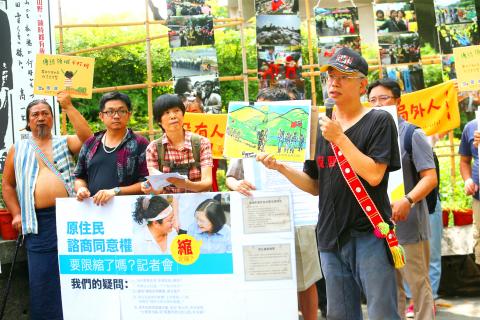Aboriginal rights advocates yesterday protested government plans that they said would reduce Aborigines’ land rights at a rally near the Presidential Office Building in Taipei, calling President Tsai Ing-wen’s (蔡英文) promise of transitional justice a lie.
On Aug. 1, the Council of Indigenous Peoples told non-Aboriginal residents of Nantou’s Yuchih Township (魚池) that it is planning to limit Aborigines’ traditional land rights after they protested against the Thao people’s newly-designated traditional territory in the township, said Salone Ishahavut, a Bunun professor of indigenous development at National Chi Nan University.
The council in June announced that more than 8,000 hectares of land in the township would be designated as the Thao people’s traditional territory.

Photo: CNA
According to the council’s current guidelines on traditional territories, any land development, wildlife conservation or anthropological projects in such areas must be approved by the Aboriginal community.
In the guidelines that the council proposed on Aug. 1, consent from local Aboriginal communities would no longer be necessary for anthropological research and land development projects, except if they require environmental impact assessments, Salone said.
According to Article 5 of the Environmental Impact Assessment Act (環境影響評估法), land development projects that require environmental impact assessments include high-rises, factories, roads, mines, water storage and drainage systems, recreational areas, sports fields, power plants, cultural, educational and medical facilities, and use of land for agriculture and forestry.
The council also proposed that, when Aboriginal consent is necessary, it would hold a vote among local Aborigines, instead of allowing the local tribal congress to decide, she said, adding that this could render the tribal congress powerless in such matters.
This is ironic considering that earlier on that day, Tsai gave a speech to the Austronesian Forum at Taipei’s Grand Hotel in which she said that she would seek to bring about reconciliation between different ethnic groups, she added.
Aug. 1 is also the day on which Tsai apologized to the Aboriginal peoples on behalf of the government two years ago, promising transitional justice for Aborigines, who have been oppressed for decades, she said.
The proposed changes to the guidelines were never submitted to the Indigenous Historical Justice and Transitional Justice Committee established for that purpose on Tsai’s orders on Aug. 1, 2016, she said.
Moreover, the government decided to discuss the draft guidelines with non-Aboriginal residents first, instead of involving Thao people in the area, she said.
“Historical records show that the Thao people used to own more than 70,000 hectares of land in the area, but the more than 700 Thao people in the area today are not greedy. They only applied to have 20,000 hectares,” she said. “Because of the disputes with other residents, the council has convinced them to accept just 8,000 hectares for now.”
The government’s policies on Aboriginal rights have been shockingly disappointing since Tsai’s apology two years ago, Fu Jen Catholic University law professor Wu Hao-jen (吳豪人) said.
While Taiwan has very progressive laws regarding Aboriginal rights, they are rarely enforced, he said, adding that Aboriginal peoples’ land rights are protected by the Indigenous Peoples Basic Act (原住民族基本法) and trying to curtail those rights through guidelines is against the law.

Taipei, New Taipei City, Keelung and Taoyuan would issue a decision at 8pm on whether to cancel work and school tomorrow due to forecasted heavy rain, Keelung Mayor Hsieh Kuo-liang (謝國樑) said today. Hsieh told reporters that absent some pressing reason, the four northern cities would announce the decision jointly at 8pm. Keelung is expected to receive between 300mm and 490mm of rain in the period from 2pm today through 2pm tomorrow, Central Weather Administration data showed. Keelung City Government regulations stipulate that school and work can be canceled if rain totals in mountainous or low-elevation areas are forecast to exceed 350mm in

EVA Airways president Sun Chia-ming (孫嘉明) and other senior executives yesterday bowed in apology over the death of a flight attendant, saying the company has begun improving its health-reporting, review and work coordination mechanisms. “We promise to handle this matter with the utmost responsibility to ensure safer and healthier working conditions for all EVA Air employees,” Sun said. The flight attendant, a woman surnamed Sun (孫), died on Friday last week of undisclosed causes shortly after returning from a work assignment in Milan, Italy, the airline said. Chinese-language media reported that the woman fell ill working on a Taipei-to-Milan flight on Sept. 22

COUNTERMEASURE: Taiwan was to implement controls for 47 tech products bound for South Africa after the latter downgraded and renamed Taipei’s ‘de facto’ offices The Ministry of Foreign Affairs is still reviewing a new agreement proposed by the South African government last month to regulate the status of reciprocal representative offices, Minister of Foreign Affairs Lin Chia-lung (林佳龍) said yesterday. Asked about the latest developments in a year-long controversy over Taiwan’s de facto representative office in South Africa, Lin during a legislative session said that the ministry was consulting with legal experts on the proposed new agreement. While the new proposal offers Taiwan greater flexibility, the ministry does not find it acceptable, Lin said without elaborating. The ministry is still open to resuming retaliatory measures against South

1.4nm WAFERS: While TSMC is gearing up to expand its overseas production, it would also continue to invest in Taiwan, company chairman and CEO C.C. Wei said Taiwan Semiconductor Manufacturing Co (TSMC) has applied for permission to construct a new plant in the Central Taiwan Science Park (中部科學園區), which it would use for the production of new high-speed wafers, the National Science and Technology Council said yesterday. The council, which supervises three major science parks in Taiwan, confirmed that the Central Taiwan Science Park Bureau had received an application on Friday from TSMC, the world’s largest contract chipmaker, to commence work on the new A14 fab. A14 technology, a 1.4 nanometer (nm) process, is designed to drive artificial intelligence transformation by enabling faster computing and greater power